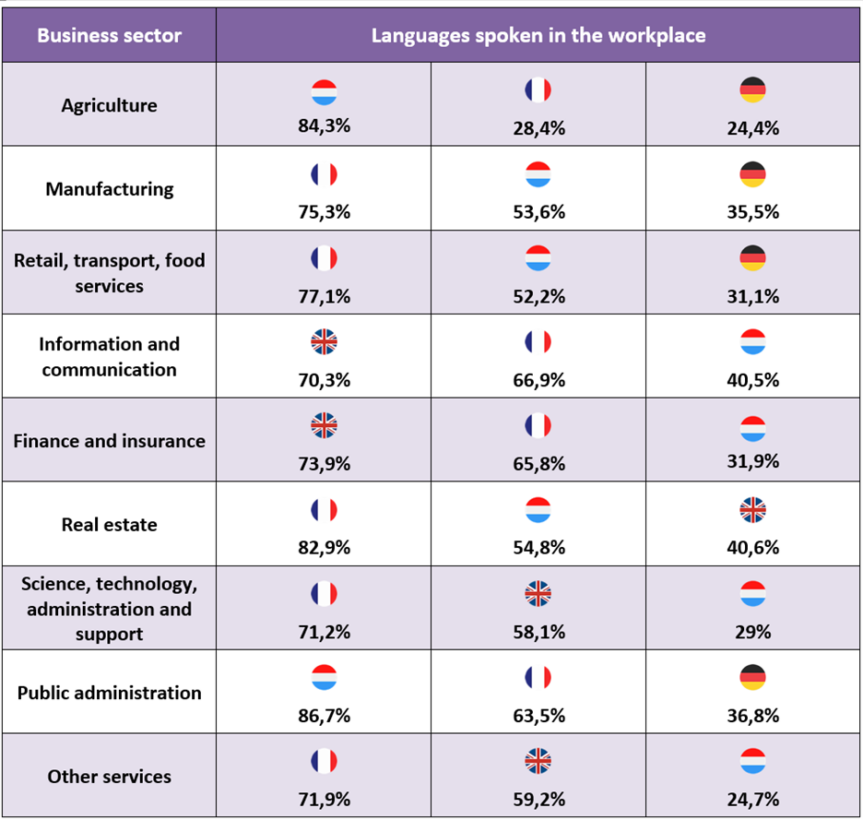Which languages are used in Luxembourg?
Are you thinking about moving to Luxembourg and finding a job in the country? Maybe you’ve already completed most of the formalities ahead of your move to Luxembourg, but still have one nagging doubt: the language. Which language(s) do you need to speak in this multilingual country? In what context? Where? Read on for myLIFE’s take on the linguistic landscape in the Grand Duchy.
Moïen, bonjour, bom dia, hello, hallo… No doubt about it, you’re in Luxembourg. You need only take a few steps in the capital for it to become clear! Listen out and you’ll hear Luxembourgish, French, Portuguese, English, German and many other languages. This linguistic diversity can be explained by the fact that foreigners make up more than 47% of the population (with 170 different nationalities) and another 228,000 people cross into the country for work each day. And that’s not to forget the locals’ own multilingualism! Luxembourg’s undeniably rich melting pot can sometimes be bewildering for newcomers.
Three official languages
Luxembourg has had three official languages ever since the 1984 law on multilingualism: Luxembourgish (Lëtzebuergesch), the national language, and French and German, which are administrative languages. In reality, though, you’ll soon see that many other languages coexist in the country. In the North and East of the country, you may find yourself having more conversations in Luxembourgish or German, whereas French and Portuguese are more prevalent in the central and southern regions. However, it is not so much geography that determines the use of one language or another, but context. Without going into too much depth, let’s try to understand the situation together.
Most of the time, you’ll be expected to have a full command of at least two languages in the business world, but the choice of language system in the workplace mainly depends on the sector.
The business sector determines which languages are used
To land a job in Luxembourg, most of the time you’ll be expected to have a full command of at least two languages, including French. It is the most spoken language in the workplace (69.2%), followed by Luxembourgish (54.4%), English (40%), and German (29.5%). However, the choice of language system in the workplace mainly depends on the sector.
French is the most used language in the majority of sectors, but it lags behind English in finance and insurance. English is also essential if you are applying for work in tourism or IT. Meanwhile, Luxembourgish leads in the public administration sector, while conversations are mostly in French in retail, hotels and catering.
The three most commonly spoken languages in 2021 by sector:

Source: Statec: RP2021 N°12 – Active residents – Dynamic, segmented employment
Useful info: Find out which languages are used in the company you want to work for. While English is a prerequisite in finance, German is highly sought-after in banks headquartered in Germany, and for logistics positions that involve working with our neighbours from across the Moselle River.
A wide array of language courses
You will have no trouble finding beginners’ or advanced lessons for the languages used in the country. Learning Luxembourgish is becoming more popular, especially since the reform of nationality laws, requiring basic knowledge of the national language.
Courses for adults are offered by the Institut National des Langues (INL) as well as professional chambers and even some schools and colleges. There are also plenty of private bodies offering a variety of learning options: private, group, work-based, remote and telephone lessons, etc.
To help you find the lessons best suited to you, visit the lifelong-learning.lu portal, which offers a wide range of courses.
Useful info: If you need to brush up on your Luxembourgish and are already in a job, you can take 200 hours of language leave over your career. Ask your employer for more information.
Schooling is multilingual in Luxembourg. Your children will receive lessons in different languages, depending on their age and school year.
A multilingual approach at school
Multilingual schooling is just one of the things that make Luxembourg unique. If you are coming to the country with your family, your children will receive lessons in different languages, depending on their age and school year.
Teachers mostly speak in Luxembourgish during key stage one, with an introduction to French. After that, lessons are given in Luxembourgish, German and/or French. Pupils thus come into contact with at least three languages during their time at school, not to mention those studied at secondary level (from the age of 12), such as English, Italian, Portuguese, Spanish and even Mandarin.
Useful info: Children who have just arrived and do not understand the language used in class can join an induction class or take language support lessons in Luxembourgish or German, to help them adjust. There are also several European and international schools in the country, where English and French are used as working languages.
Locals naturally switch from one language to another mid-conversation.
Which language(s) should be used in everyday life in Luxembourg?
Linguistic diversity is part of everyday life, too, and the various languages naturally come into contact with each other. Don’t be surprised to see locals switching from one language to another mid-conversation. It happens a lot!
When you’re out shopping, you may be spoken to in French, Luxembourgish, English or German. In restaurants, you might be addressed in French or English. Depending on the type of establishment, you may even be able to order in Italian, Portuguese, Spanish, etc. You can read (physical or online) newspapers in Luxembourgish, as well as in German, English, French and Portuguese. In hospitals, you should theoretically be able to find people who can speak the country’s three languages. This will also be the case for administrative matters: with the local authority, taxes, social security, banks, insurers, etc.
Useful info: Cultural life is also multilingual in the Grand Duchy. For example, many bookshops sell works in different languages; theatres have an international programme; cinemas show films in their original language with subtitles in French, German or even Dutch.
While language practices are varied in Luxembourg, knowledge of Luxembourgish is considered a big advantage in settling into the country, both privately and professionally. Adding a Villmools Merci or Äddi to a sentence, entering a shop with a Moien or gudde Owend and being able to say a few words to your neighbours in their language will always go down well. Take the plunge and immerse yourself in Luxembourgish; its diverse influences will help you to truly connect with the culture of the region. Bis geschwënn!


 Mortgage
Mortgage Personal loan
Personal loan Savings
Savings